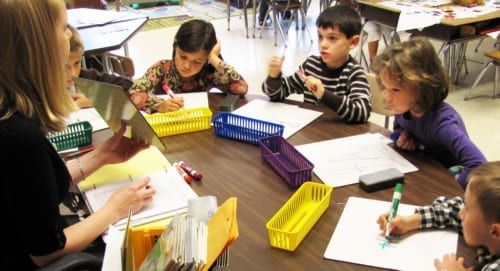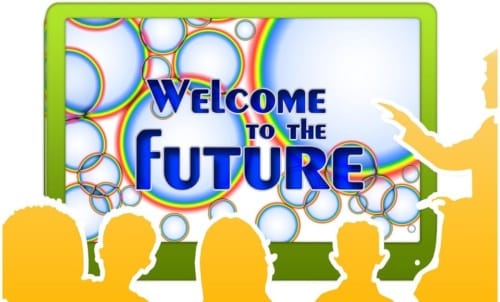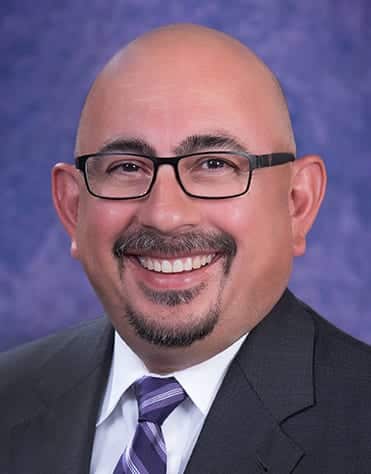How the current accountability standards broke education
 Michael Cardona is part of a growing group of teachers and administrators who are speaking out against the system of accountability that has been forced upon districts and schools for decades. As the Superintendent of Schools for San Marcos CISD in Texas, he is at the forefront of the debate is the use of standardized assessment scores as the sole measuring stick of student progress.
Michael Cardona is part of a growing group of teachers and administrators who are speaking out against the system of accountability that has been forced upon districts and schools for decades. As the Superintendent of Schools for San Marcos CISD in Texas, he is at the forefront of the debate is the use of standardized assessment scores as the sole measuring stick of student progress.
Michael has some progressive thoughts about accountability in schools; he talks about how the current standardized assessment method has “overwhelmed the system” and how it has placed an enormous amount of stress on not only students and their parents, but on the teachers as well. He favors local control with a more holistic approach to accountability — one that considers other learning factors, not just test scores.
Michael believes that giving control back to communities will create a learning organization that encourages people to make mistakes; the community will accept mistakes being made if they know there is a movement away from teachers being on a stage to a more inclusive idea of everyone working together to educate children. He believes that teachers and administrators, by their very nature, wish to be held accountable for what they do in the classroom, but in a meaningful way.
As part of the effort, Michael says, “We’ve made a concerted effort to rebrand ourselves and encourage our teachers to be on social media, to be on Facebook, because the mothers are on Facebook.” Mothers form groups, and they talk about what’s not working inside school systems. An absence of teacher involvement in social media can, unfortunately, perpetuate negative dialogue into looking like the truth. Teacher participation has a way of balancing the narrative.
The future is now in education, and it’s leaders like Michael Cardona who are leading the way.
Interview:
Dr. Berger: Let’s change our conversational path a little bit and let’s talk about some topics that seem to be on the leading… or even bleeding edge, because some people don’t want to talk about them… but I’m finding more and more superintendents who do.
One of those topics would be around these community-focused accountability systems and the way in which we are talking about influencing our curriculum, the way in which we train our staff, and the way we talk about it with our parents.
Where are you with that, Michael? Are we starting to turn the page on a new era where we start to break down and define what in the world does it mean to be in school, and how we track that?
Micheal Cardona: All of us superintendents, at least here in Texas, are at a crossroads. We all want to be held accountable for something. We hold ourselves to the highest standards of really making sure that our kids are taken care of and that when they graduate, we know ─ at least we have good robust data ─ that when they walk across that stage, they are prepared and can make real choices to do whatever it is they want to do in life. They can go military. They can go career, or they can go college. We know with reasonable assurance that we’ve done everything we reasonably could to make sure they’re going to be successful in doing that.
 But I think there’s been this movement of accountability that’s overwhelmed the system and that’s put this enormous amount of stress on not only students and their parents, but on teachers as well.
But I think there’s been this movement of accountability that’s overwhelmed the system and that’s put this enormous amount of stress on not only students and their parents, but on teachers as well.
Teachers, intuitively, are very self-reflective. They get into this business because they want to help kids and they want kids to do better than they did in life.
We’re built on local control, and I think our communities should know what it is that they’re going to hold us accountable.
And you’re starting to see a move towards that. In Texas, we have the “District of Innovation” which allows districts to look at alternative ways to assess accountability which, I think, is a great thing that we’re doing.
Somebody once said, “I know what’s going on anywhere in the world with just my fingertips on my phone. But I don’t know what’s going on inside my own child’s classroom.”
I think we have the opportunity with technology and with just the great teachers that we have to look at things and showcase them and be held accountable for what’s going on inside the actual classroom during the day.
There’s a lot of good stuff taking place. There are so many digital platforms available that you can use to open the classroom door, and I think that holds us accountable. I think, as leaders, we all recognize that we want our kids to be on grade level. We want them to be able to think. We want them to be able to be leaders in the community. We want them to be collaborative.
None of that is measured by our current system of testing right now ─ not even PSAT, not even ACT. There’s going to come a time, I think when teachers and parents get together and say, “I think we know what’s best for our kids. We want to be held accountable for what happens in our buildings. But let us figure that out within our communities.”
And you’re starting to see a move in that way, and I think even the states are starting to adapt. The federal government even relaxed some things as far as accepting state plans for accountability, trying to encourage that. And I think it’s a good move to allow local control.
And our parents will hold us accountable. They have proven that they will hold us to high standards.
DB: Michael, to your earlier point ─ that we know more about what’s going on right now in the world at large just by just glancing on our phone than we do in our schools two or three miles away from where our children are spending their days. I’ll have conversations as a parent with other parents, and the question I get is always “I don’t know how to participate. I don’t know what my role is. I don’t know where the impact could be” because they didn’t experience that in their education.
 I believe that it helps to engage the child when they know that they have that support system. That they know it’s not this linear thing that they are at home, they go to school, and they go back home; that it’s all-encompassing. It’s an environment. It’s comprehensive in that Mom or Dad or caretaker are there and a part of that ecosystem in a way that is communicative and provides, I think, feedback to the teacher. So isn’t it incumbent upon us to provide parents with an opportunity where not only do they have access to the classroom but it’s access that allows them to participate?
I believe that it helps to engage the child when they know that they have that support system. That they know it’s not this linear thing that they are at home, they go to school, and they go back home; that it’s all-encompassing. It’s an environment. It’s comprehensive in that Mom or Dad or caretaker are there and a part of that ecosystem in a way that is communicative and provides, I think, feedback to the teacher. So isn’t it incumbent upon us to provide parents with an opportunity where not only do they have access to the classroom but it’s access that allows them to participate?
MC: Yes. I completely agree. I think it’s a move away from the old “involvement.” The parents show up on a Tuesday night for Open House. They walk their kids’ schedules to, eventually, kids leading the discussion with their teachers and parents about “Hey, Mom, this is where I’m at in my learning process.”
Not only parents but we do have platforms that are being developed that allow others to be involved in a child’s education.
To me, it’s understanding the stories kids come in with from the outside and then it’s how we help them navigate that educational journey. But we also need to allow kids to take ownership and involve those other people like grandparents, aunts, uncles, brothers and sisters in the learning process to give feedback as well.
Video is a good way to do that, get them involved. We work with a company where we started piloting on videotaping teachers in the classroom and asking them just a series of questions to self-reflect on what it is they’re doing, what the kid is doing, and then how they know that the learning takes place.
We’re getting really positive feedback from teachers about how they like the feedback. And it’s like “Don’t you think parents and kids would also like it?”
But I think you have to have a learning organization that encourages people to make mistakes and a community that will accept the mistakes being made if they know that we’re moving away from the teachers on that stage to “we’re all in this together.”
And, sometimes, parents do know their kids and if we would listen to them and open up and not be in a defensive posture, I think organizations can do great things for kids and we can adapt pretty quickly.
DB: Michael, I’ve seen some research in the past couple of years that the way in which we’re utilizing technology in education is shifting the paradigm of the type of people who are going into the teaching profession. We are putting demands on educators; they feel that they have to be accessible through technology for what feels like 24/7. There are, of course, different personality types and backgrounds that gravitate towards that, and might retreat.
 So how do you, as a leader, look at that and say, “Alright, I want to make sure that, yes, we all know it’s a technology-driven classroom that we’re working in now.” How do you provide support to those veteran teachers or even the brand new, early career teachers that think that this is not exactly what they thought they would be doing? They’re all dependent upon you and your team to provide them the skills, the resources, and the training.
So how do you, as a leader, look at that and say, “Alright, I want to make sure that, yes, we all know it’s a technology-driven classroom that we’re working in now.” How do you provide support to those veteran teachers or even the brand new, early career teachers that think that this is not exactly what they thought they would be doing? They’re all dependent upon you and your team to provide them the skills, the resources, and the training.
How do we support teachers in this environment where we know access from parents to their children ─ students in the school ─ is increasing, and that’s just the way our society is now? We parents want access. We want it all the time. How do you prepare your teachers in the district for this environment?
MC: First and foremost, as I’ve mentioned earlier, we want the teachers to understand the stories and the data that kids come into the building with. So we, in central administration, have to actually practice the same thing we expect of our teachers. And so, professional development is not all standards-based. I hated going to the principal’s meeting and just sitting and listening to them talk.
I think if you have professional development that allows the teacher to have the choice in their learning ─ sometimes the learning isn’t based on standards or academics, it’s on addressing teacher self-care and their level of competency ─ I think you’re going to get an organization where teachers will feel encouraged.
Now, it is a media world. When we first came here, we heard in one year a lot of “This isn’t the way we do things in this district!” I said, “That’s great! But there are other systems that are doing things much better and much quicker for kids than we are currently.”
I think once teachers actually started to see us allowing them to do different things that weren’t the same old professional development, we’ve been getting a better response. We’ve gotten more teachers on Twitter, because the reality is that parents find out things and we tell our teachers, “It’s better that you tell your story about what’s going than if somebody else presupposed something and told the story for you.”
We’ve made a concerted effort to rebrand ourselves and encourage our teachers to be on social media, to be on Facebook because mothers are on Facebook. They have little groups, and they talk about what’s bad in the school systems. And absent them seeing anything from the school, they’re going to assume that that’s the truth.
And that’s an unfair thing to put on a teacher, but I think if teachers feel like the administration is not always about academics and regimens and “We have to be here in this place at this time at this given point,” I think they’ll do what it is that they need to do.
We had mindfulness training this past weekend with about 20 teachers on a Saturday and, believe it or not, out of the 20, we had a large veteran group of teachers. Some of them have been in education for 25 to 30 years and they were showing their own mindfulness practices to other teachers.
 There was a reporter from this foundation and she said, “Who do you want to talk to?” and I said, “Talk to any of these principals or teachers because if they’re here on a Saturday, they’re invested in us making sure that they’re taken care of. You have some teachers here who have been in the district for 35-plus years and they’re leading mindfulness exercises.”
There was a reporter from this foundation and she said, “Who do you want to talk to?” and I said, “Talk to any of these principals or teachers because if they’re here on a Saturday, they’re invested in us making sure that they’re taken care of. You have some teachers here who have been in the district for 35-plus years and they’re leading mindfulness exercises.”
I think that they’re adapting because we’re giving them a choice. We even had a first-grade teacher who took a selfie with me because we were doing that social game of “Where’s Cardona?” That man has never been on Twitter and that was his first tweet.
“I’m here at mindfulness training and I have to take a picture with the boss and ‘Where is Cardona?’”
I think that’s learning and that’s going to translate to him walking back into the classroom and saying, “Maybe we won’t do a worksheet today. Let’s go outside and explore the space and let’s do a video diary of what’s going on today instead of just doing the simple spelling worksheet.”
Teachers will adjust if they’re just encouraged to make mistakes.
About Michael Cardona:
 Michael A. Cardona was named Superintendent of Schools for San Marcos CISD on May 2, 2016. Prior to this position, Michael served as the Chief School Officer in the Houston Independent School District, the state’s largest school system.
Michael A. Cardona was named Superintendent of Schools for San Marcos CISD on May 2, 2016. Prior to this position, Michael served as the Chief School Officer in the Houston Independent School District, the state’s largest school system.
Prior to joining Houston ISD, Michael was a secondary principal and assistant principal in the North East Independent School District in San Antonio and an assistant principal, teacher, and administrative intern in San Antonio ISD. During this period, he earned numerous awards, including being a state semi-finalist in both 2011 and 2012 in the Secondary Principal’s Category for the H.E.B. Excellence in Education Award. In 2014, he was awarded the Paul R. Hensarling Award for Distinguished Scholar from Texas A&M University.
Michael earned a Bachelor of Arts degree from Texas A&M University – College Station in Political Science. He went on to earn a Master of Education from Texas A&M – Kingsville in Mid-Management and is currently working on his Doctor of Education at Texas A&M University-College Station.
Follow Michael Cardona on Twitter.
This article was originally published in the Huffington Post
AuthorDr. Berger is one of many industry education correspondents for the Mind Rocket Media Group, An educator and former school administrator. His video interview work and conversational podcasts have been featured in various media outlets. He often hosts education panel discussions and develops strategic content. As an academic Dr. Berger is a guest lecturer at Vanderbilt University’s Owen Graduate School of Management. A former assistant principal, he has been an adjunct undergraduate professor and developer of online college courses. He is a passionate Detroit sports fan who has also adopted Nashville sports teams as his own.
Contact the Mind Rocket Media Group if you are interested in an industry interview and a placement on EdCircuit.
- Los Angeles Times – Students’ progress stalls on California’s standardized tests
- Sooke News Mirror – Technology increasingly being used to track students progress in SD62
- The Atlanta Journal Constitution – Georgia to search for alternative to standardized state tests




